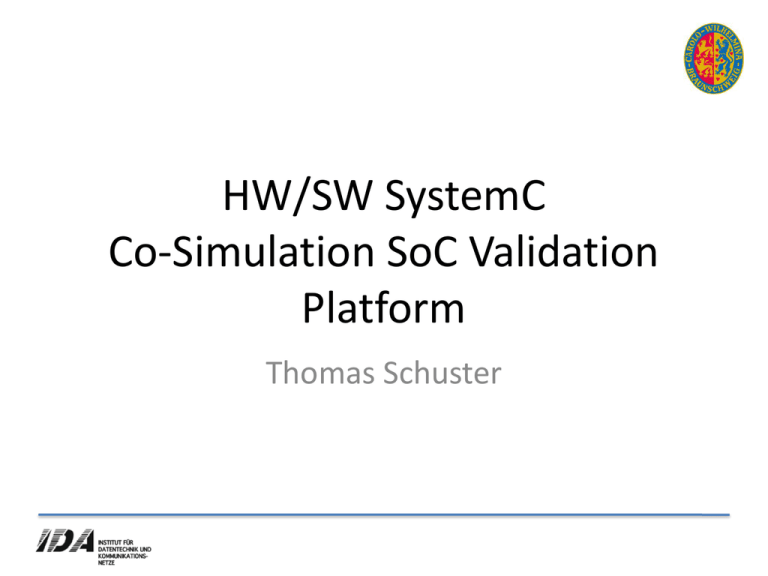HW/SW Co-simulation Platform - ESA Microelectronics Section
advertisement

HW/SW SystemC Co-Simulation SoC Validation Platform Thomas Schuster Outline 1.Introduction TU Braunschweig/IDA 2.Study Objectives & Organization 3.Virtual Platform Infrastructure 4.Development of TLM 2.0 Simulation Models 5.Proof-of-concept VP 1. TECHNISCHE UNIVERSITÄT BRAUNSCHWEIG 14.000 3.000 1.600 5 40 Students University staff Scientists Departments Degree Programs Founded in 1745 (oldest university of technology in Germany) School of Carl-Friedrich Gauß IDA Institute of Computer and Communication Network Engineering Institute of Computer and Communication Network Engineering director: Prof. Rolf Ernst computer aided embedded system design embedded computers for space applications communication networks Prof. Admela Jukan VLSI systems design Prof. Mladen Berekovic Prof. Rolf Ernst Prof. Harald Michalik cryptography sponsored by Intel Prof. Wael Adi • ca. 60 employees (21 univ. funded) • ca. 2.2 Mio. € 3rd party funding in 2006 • part of department of EE&IT staff secretariat accounting system administration electronic lab mechanical lab People involved IDA: Prof. Dr. Harald Michalik Prof. Dr. Mladen Berekovic Study Management Chief Technical Scientist Thomas Schuster Dennis Bode Bjoern Osterloh Study Engineer Study Engineer Study Engineer ESA Supervisors: Dr. Luca Fossati Dr. Laurent Hili 2. Project Objectives • High-Level modeling of key IPs in TLM 2.0 • Functional validation and timing accuracy analysis • Power Modeling • Definition of a design flow for VP modeling • Selection of appropriate infrastructure • Development of a proof-of-concept Virtual Platform • Demonstration of a design space exploration www.vlsilab.org Study Organization Jan 2010 today July 2011 Virtual Platform / Advantages A Virtual Platform is an abstract hardware model that is simulated by software. VPs can easily be duplicated and packaged allowing multiple developers to work in parallel. Unlike physical hardware VPs provide observability and controllability for the entire system. Software development can start before hardware prototypes are available. Productivity Availability Accessibility Consistency VPs can be cosimulated/emulated. Gradual refinement from high abstraction to RTL eases verification. 3. Selection of VP Infrastructure Requirements: • Open Source (GPL, L-GPL) • Support for TLM 2.0 (LT and AT) • Concept for development of: - memory mapped devices - complex bus models • Vendor tool independence System shall be developed around TRAP (Transaction level Automatic Processor generator) http://code.google.com/p/trap-gen/ Survey on Tools & Techniques VPI Originated by License Pros Cons Coware Virtual Platform Coware Inc. Com + runtime Sophisticated, Processor Designer, in-house expertise expensive Carbon SoC Designer Carbon Design Systems Com + runtime Sophisticated, Model Compiler expensive OVP Imperas semi-com TLM 2.0 compliant, large open component lib, widespread simulator not open-source SOCLIB ANR project (ST, Thales, …) GPL Widespread, large community no TLM 2.0 UNISIM HiPEAC project INRIA BSD Existing component library no TLM 2.0 contrib. slow down ReSP ESA project Politecnico di Milano GPL Existing components (LEON), ESA affiliation no TLM 2.0 contrib. low GreenSocs GreenSocs Ltd. GPL TLM 2.0, TU-BS expertise - Open Tools for TLM 2.0 are hard to find. is closest to requirements Mission: • Provision of vendor-independent infrastructure • Open platform for joint IP development Infrastructure (selected): GreenBus GreenReg GreenControl GreenScript - Foundation for Bus Modeling with TLM 2.0 (incl. AMBA impl. almost ready-to-use) - Framework for Register & Device Modeling - Control and Configuration Interfaces (CCI) - Methods and Tools for Use-Case capture … and much more, see: www.greensocs.com GreenSocs System Overview Source: Mark Burton, GreenSocs 4. Modeling of SystemC IP No. IP 1 AMBA AHB 2 Aeroflex Gaisler GRLIB MCTRL Memory Controller 3 A memory model working with IP 2 4 A Harvard L1 cache 5 A SPARCv8 MMU or equivalent 6 Aeroflex Gaisler GPTIMER General Purpose Timer 7 Aeroflex Gaisler IRQMP Interrupt Controller Models will be implemented in LT and AT flavor of TLM 2.0 Transaction Level Modeling Simulation Performance Accuracy Function calls through dedicated interfaces model synchronization of concurrent threads of execution. TLM 2.0 Loosely Timed (LT) – blocking communication, temporal decoupling TLM 2.0 Approximately Timed (AT)– non-blocking communication 2 Phase AT (begin request, end response) 4 Phase AT (begin/end request, begin/end response) n Phase AT Cycle Accurate SystemC or RTL simulation Device Modeling with GreenReg GreenReg Protocol (Socket) Register Set User Model Regfile callbacks reg reg reg behavior timing power Example Slave Module • Registers can be automatically hooked on sockets • Registers provide Pre/Post Read/Write callbacks to behavior Verification of IP Models Reference Simulation (TLM/RTL) Full TLM Simulation test vectors test vectors TLM Stimuli/Monitor AMBA TLM/RTL Adapter RTL TLM Stimuli/Monitor AMBA TLM Design Under Test Design Under Test Models will be evaluated with respect to simulation performance & accuracy. 5. Proof-of-Concept VP MEM Aerofle x MCTRL Status/Ct rl Regs MEM Aeroflex IRQMP CAN Space Wire Segmented 2x4 LEON AHB processors SoC Wire AMBA Aeroflex Aeroflex GPTimer Aeroflex Aeroflex GPTimer GPTimer GPTimer MEM Bridge Bridge Aeroflex Aeroflex GPTimer Aeroflex Aeroflex GPTimer GPTimer GPTimer Mem AMBA AMBA LEON3 LEON3 LEON3 LEON3 LEON3 LEON3 LEON3 LEON3 Cache Cache Cache Cache Cache Cache Cache Cache MMU MMU MMU MMU MMU MMU MMU MMU Multi-Processor system stimulating all IPs generated in the course of the project. Platform Software Architecture Open Source Software Architecture: Compiler OS GNU Compiler Collection + Embedded C library Real-Time Executive for Multi-processor Systems A set of MiBench applications will be executed on top of RTEMS: HW/SW SystemC Co-Simulation Platform Thank you for your attention!

